Law of Business Organization: UVAC and Lovely Teas Pty Ltd Analysis
VerifiedAdded on 2022/09/16
|8
|2276
|17
Report
AI Summary
This report provides a comprehensive analysis of two case studies, UVAC and Lovely Teas Pty Ltd, focusing on key aspects of business law and corporate governance. Part A examines the legal implications for UVAC, addressing the rights of shareholders, particularly Norah, in preventing actions taken by the company that violate the Corporations Act and the company's constitution. It explores the duties of directors, as defined by the Corporations Act 2001, including the duty of care, diligence, and the prohibition of misuse of position or information. Part B shifts the focus to Lovely Teas Pty Ltd, assessing the breaches of Section 181 of the Corporations Act by its directors, specifically concerning good faith and the treatment of employees. The report discusses the legal responsibilities of directors, penalties for breaches, and potential remedies, including the liability of a subsidiary company. It utilizes relevant case laws, legislation, and legal principles to provide a thorough understanding of the legal issues and obligations involved.
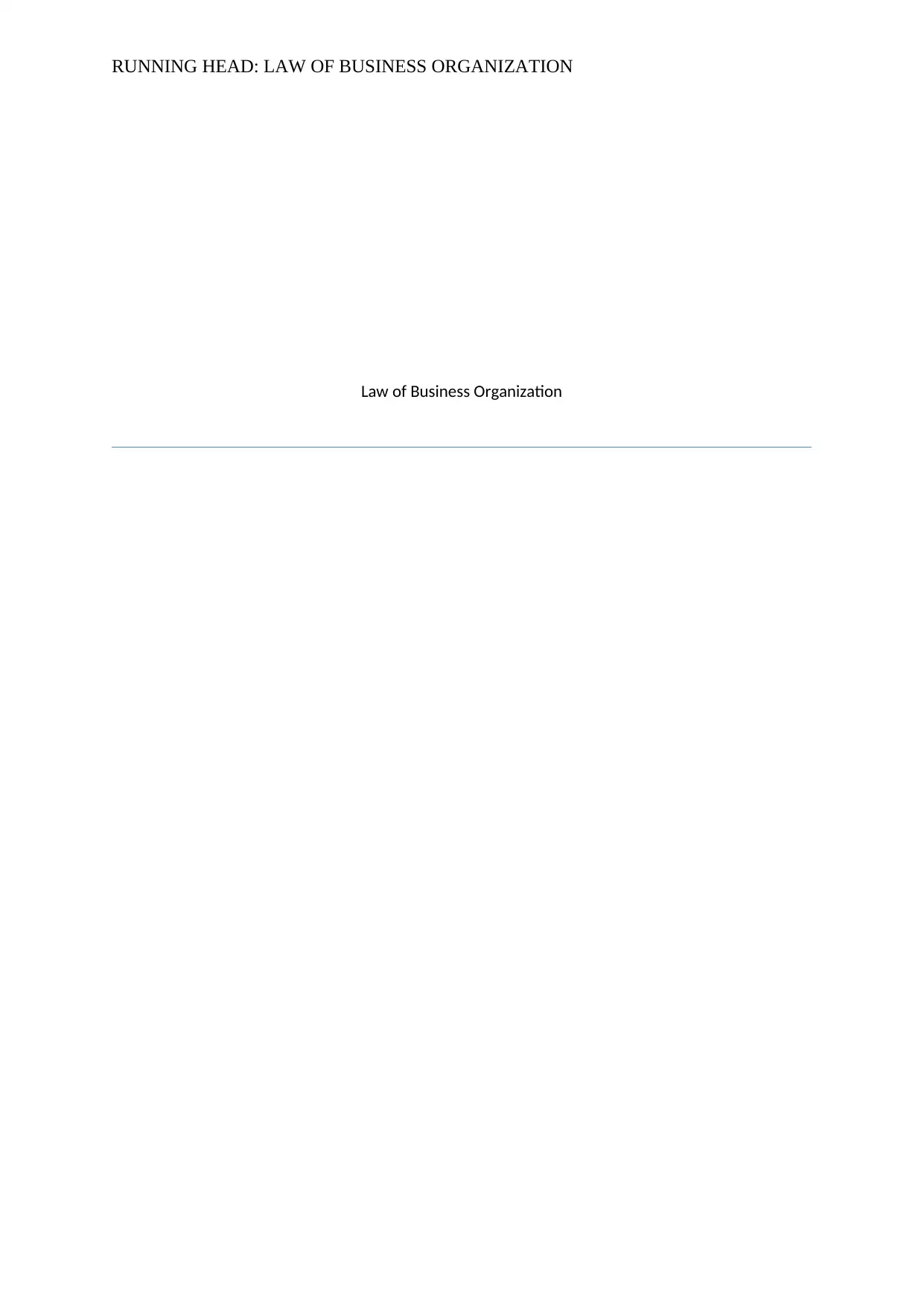
RUNNING HEAD: LAW OF BUSINESS ORGANIZATION
Law of Business Organization
Law of Business Organization
Paraphrase This Document
Need a fresh take? Get an instant paraphrase of this document with our AI Paraphraser
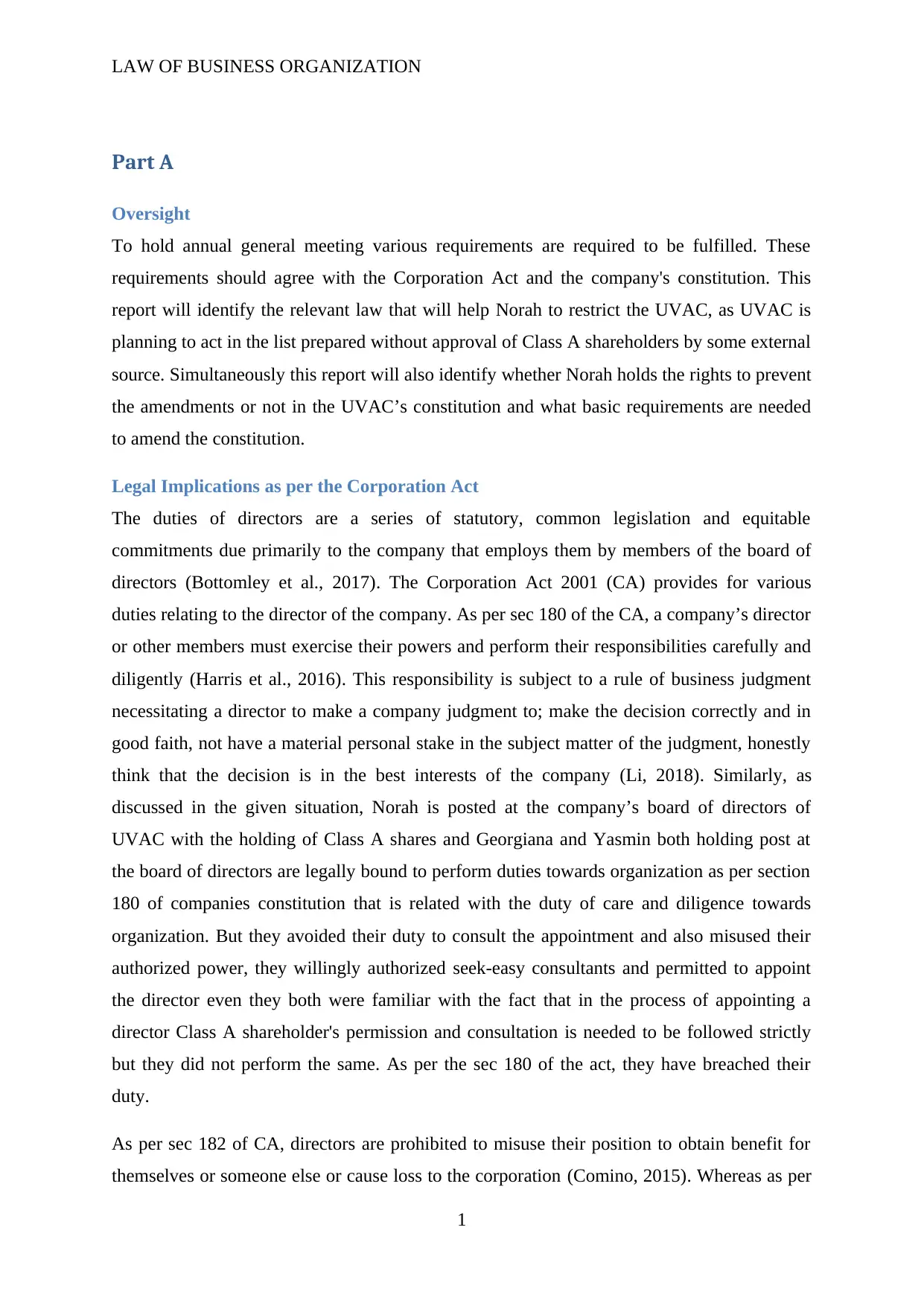
LAW OF BUSINESS ORGANIZATION
Part A
Oversight
To hold annual general meeting various requirements are required to be fulfilled. These
requirements should agree with the Corporation Act and the company's constitution. This
report will identify the relevant law that will help Norah to restrict the UVAC, as UVAC is
planning to act in the list prepared without approval of Class A shareholders by some external
source. Simultaneously this report will also identify whether Norah holds the rights to prevent
the amendments or not in the UVAC’s constitution and what basic requirements are needed
to amend the constitution.
Legal Implications as per the Corporation Act
The duties of directors are a series of statutory, common legislation and equitable
commitments due primarily to the company that employs them by members of the board of
directors (Bottomley et al., 2017). The Corporation Act 2001 (CA) provides for various
duties relating to the director of the company. As per sec 180 of the CA, a company’s director
or other members must exercise their powers and perform their responsibilities carefully and
diligently (Harris et al., 2016). This responsibility is subject to a rule of business judgment
necessitating a director to make a company judgment to; make the decision correctly and in
good faith, not have a material personal stake in the subject matter of the judgment, honestly
think that the decision is in the best interests of the company (Li, 2018). Similarly, as
discussed in the given situation, Norah is posted at the company’s board of directors of
UVAC with the holding of Class A shares and Georgiana and Yasmin both holding post at
the board of directors are legally bound to perform duties towards organization as per section
180 of companies constitution that is related with the duty of care and diligence towards
organization. But they avoided their duty to consult the appointment and also misused their
authorized power, they willingly authorized seek-easy consultants and permitted to appoint
the director even they both were familiar with the fact that in the process of appointing a
director Class A shareholder's permission and consultation is needed to be followed strictly
but they did not perform the same. As per the sec 180 of the act, they have breached their
duty.
As per sec 182 of CA, directors are prohibited to misuse their position to obtain benefit for
themselves or someone else or cause loss to the corporation (Comino, 2015). Whereas as per
1
Part A
Oversight
To hold annual general meeting various requirements are required to be fulfilled. These
requirements should agree with the Corporation Act and the company's constitution. This
report will identify the relevant law that will help Norah to restrict the UVAC, as UVAC is
planning to act in the list prepared without approval of Class A shareholders by some external
source. Simultaneously this report will also identify whether Norah holds the rights to prevent
the amendments or not in the UVAC’s constitution and what basic requirements are needed
to amend the constitution.
Legal Implications as per the Corporation Act
The duties of directors are a series of statutory, common legislation and equitable
commitments due primarily to the company that employs them by members of the board of
directors (Bottomley et al., 2017). The Corporation Act 2001 (CA) provides for various
duties relating to the director of the company. As per sec 180 of the CA, a company’s director
or other members must exercise their powers and perform their responsibilities carefully and
diligently (Harris et al., 2016). This responsibility is subject to a rule of business judgment
necessitating a director to make a company judgment to; make the decision correctly and in
good faith, not have a material personal stake in the subject matter of the judgment, honestly
think that the decision is in the best interests of the company (Li, 2018). Similarly, as
discussed in the given situation, Norah is posted at the company’s board of directors of
UVAC with the holding of Class A shares and Georgiana and Yasmin both holding post at
the board of directors are legally bound to perform duties towards organization as per section
180 of companies constitution that is related with the duty of care and diligence towards
organization. But they avoided their duty to consult the appointment and also misused their
authorized power, they willingly authorized seek-easy consultants and permitted to appoint
the director even they both were familiar with the fact that in the process of appointing a
director Class A shareholder's permission and consultation is needed to be followed strictly
but they did not perform the same. As per the sec 180 of the act, they have breached their
duty.
As per sec 182 of CA, directors are prohibited to misuse their position to obtain benefit for
themselves or someone else or cause loss to the corporation (Comino, 2015). Whereas as per
1
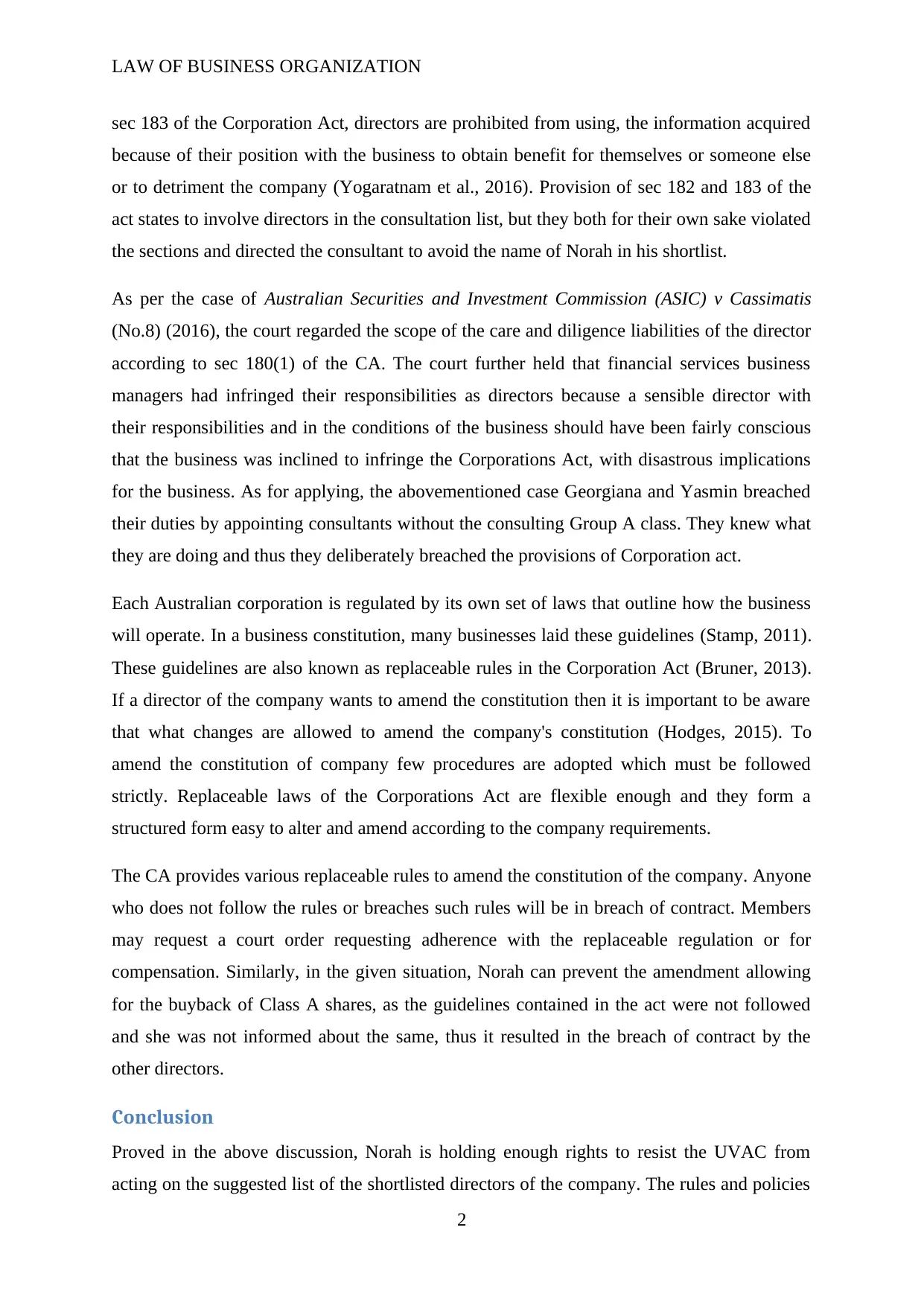
LAW OF BUSINESS ORGANIZATION
sec 183 of the Corporation Act, directors are prohibited from using, the information acquired
because of their position with the business to obtain benefit for themselves or someone else
or to detriment the company (Yogaratnam et al., 2016). Provision of sec 182 and 183 of the
act states to involve directors in the consultation list, but they both for their own sake violated
the sections and directed the consultant to avoid the name of Norah in his shortlist.
As per the case of Australian Securities and Investment Commission (ASIC) v Cassimatis
(No.8) (2016), the court regarded the scope of the care and diligence liabilities of the director
according to sec 180(1) of the CA. The court further held that financial services business
managers had infringed their responsibilities as directors because a sensible director with
their responsibilities and in the conditions of the business should have been fairly conscious
that the business was inclined to infringe the Corporations Act, with disastrous implications
for the business. As for applying, the abovementioned case Georgiana and Yasmin breached
their duties by appointing consultants without the consulting Group A class. They knew what
they are doing and thus they deliberately breached the provisions of Corporation act.
Each Australian corporation is regulated by its own set of laws that outline how the business
will operate. In a business constitution, many businesses laid these guidelines (Stamp, 2011).
These guidelines are also known as replaceable rules in the Corporation Act (Bruner, 2013).
If a director of the company wants to amend the constitution then it is important to be aware
that what changes are allowed to amend the company's constitution (Hodges, 2015). To
amend the constitution of company few procedures are adopted which must be followed
strictly. Replaceable laws of the Corporations Act are flexible enough and they form a
structured form easy to alter and amend according to the company requirements.
The CA provides various replaceable rules to amend the constitution of the company. Anyone
who does not follow the rules or breaches such rules will be in breach of contract. Members
may request a court order requesting adherence with the replaceable regulation or for
compensation. Similarly, in the given situation, Norah can prevent the amendment allowing
for the buyback of Class A shares, as the guidelines contained in the act were not followed
and she was not informed about the same, thus it resulted in the breach of contract by the
other directors.
Conclusion
Proved in the above discussion, Norah is holding enough rights to resist the UVAC from
acting on the suggested list of the shortlisted directors of the company. The rules and policies
2
sec 183 of the Corporation Act, directors are prohibited from using, the information acquired
because of their position with the business to obtain benefit for themselves or someone else
or to detriment the company (Yogaratnam et al., 2016). Provision of sec 182 and 183 of the
act states to involve directors in the consultation list, but they both for their own sake violated
the sections and directed the consultant to avoid the name of Norah in his shortlist.
As per the case of Australian Securities and Investment Commission (ASIC) v Cassimatis
(No.8) (2016), the court regarded the scope of the care and diligence liabilities of the director
according to sec 180(1) of the CA. The court further held that financial services business
managers had infringed their responsibilities as directors because a sensible director with
their responsibilities and in the conditions of the business should have been fairly conscious
that the business was inclined to infringe the Corporations Act, with disastrous implications
for the business. As for applying, the abovementioned case Georgiana and Yasmin breached
their duties by appointing consultants without the consulting Group A class. They knew what
they are doing and thus they deliberately breached the provisions of Corporation act.
Each Australian corporation is regulated by its own set of laws that outline how the business
will operate. In a business constitution, many businesses laid these guidelines (Stamp, 2011).
These guidelines are also known as replaceable rules in the Corporation Act (Bruner, 2013).
If a director of the company wants to amend the constitution then it is important to be aware
that what changes are allowed to amend the company's constitution (Hodges, 2015). To
amend the constitution of company few procedures are adopted which must be followed
strictly. Replaceable laws of the Corporations Act are flexible enough and they form a
structured form easy to alter and amend according to the company requirements.
The CA provides various replaceable rules to amend the constitution of the company. Anyone
who does not follow the rules or breaches such rules will be in breach of contract. Members
may request a court order requesting adherence with the replaceable regulation or for
compensation. Similarly, in the given situation, Norah can prevent the amendment allowing
for the buyback of Class A shares, as the guidelines contained in the act were not followed
and she was not informed about the same, thus it resulted in the breach of contract by the
other directors.
Conclusion
Proved in the above discussion, Norah is holding enough rights to resist the UVAC from
acting on the suggested list of the shortlisted directors of the company. The rules and policies
2
⊘ This is a preview!⊘
Do you want full access?
Subscribe today to unlock all pages.

Trusted by 1+ million students worldwide
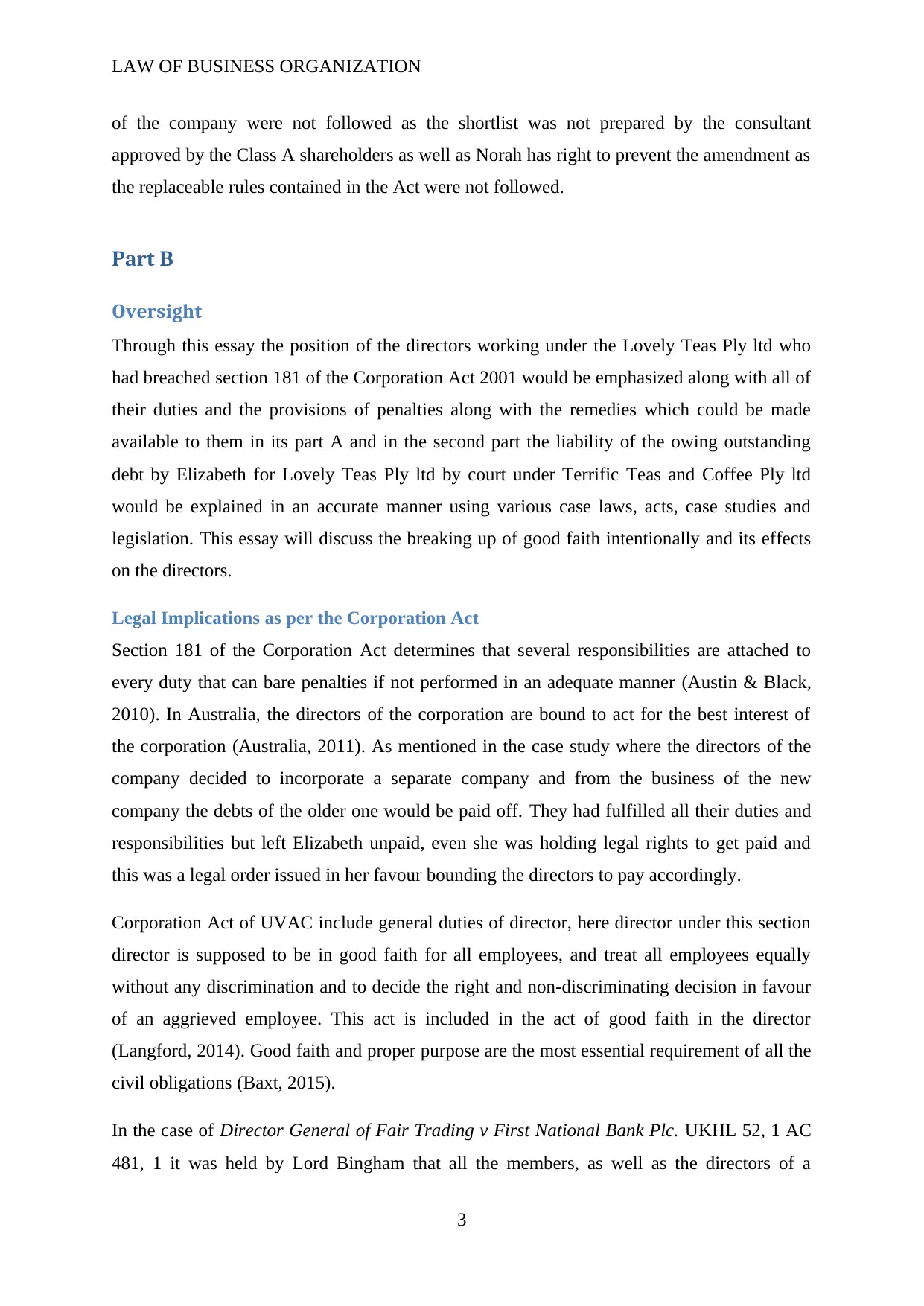
LAW OF BUSINESS ORGANIZATION
of the company were not followed as the shortlist was not prepared by the consultant
approved by the Class A shareholders as well as Norah has right to prevent the amendment as
the replaceable rules contained in the Act were not followed.
Part B
Oversight
Through this essay the position of the directors working under the Lovely Teas Ply ltd who
had breached section 181 of the Corporation Act 2001 would be emphasized along with all of
their duties and the provisions of penalties along with the remedies which could be made
available to them in its part A and in the second part the liability of the owing outstanding
debt by Elizabeth for Lovely Teas Ply ltd by court under Terrific Teas and Coffee Ply ltd
would be explained in an accurate manner using various case laws, acts, case studies and
legislation. This essay will discuss the breaking up of good faith intentionally and its effects
on the directors.
Legal Implications as per the Corporation Act
Section 181 of the Corporation Act determines that several responsibilities are attached to
every duty that can bare penalties if not performed in an adequate manner (Austin & Black,
2010). In Australia, the directors of the corporation are bound to act for the best interest of
the corporation (Australia, 2011). As mentioned in the case study where the directors of the
company decided to incorporate a separate company and from the business of the new
company the debts of the older one would be paid off. They had fulfilled all their duties and
responsibilities but left Elizabeth unpaid, even she was holding legal rights to get paid and
this was a legal order issued in her favour bounding the directors to pay accordingly.
Corporation Act of UVAC include general duties of director, here director under this section
director is supposed to be in good faith for all employees, and treat all employees equally
without any discrimination and to decide the right and non-discriminating decision in favour
of an aggrieved employee. This act is included in the act of good faith in the director
(Langford, 2014). Good faith and proper purpose are the most essential requirement of all the
civil obligations (Baxt, 2015).
In the case of Director General of Fair Trading v First National Bank Plc. UKHL 52, 1 AC
481, 1 it was held by Lord Bingham that all the members, as well as the directors of a
3
of the company were not followed as the shortlist was not prepared by the consultant
approved by the Class A shareholders as well as Norah has right to prevent the amendment as
the replaceable rules contained in the Act were not followed.
Part B
Oversight
Through this essay the position of the directors working under the Lovely Teas Ply ltd who
had breached section 181 of the Corporation Act 2001 would be emphasized along with all of
their duties and the provisions of penalties along with the remedies which could be made
available to them in its part A and in the second part the liability of the owing outstanding
debt by Elizabeth for Lovely Teas Ply ltd by court under Terrific Teas and Coffee Ply ltd
would be explained in an accurate manner using various case laws, acts, case studies and
legislation. This essay will discuss the breaking up of good faith intentionally and its effects
on the directors.
Legal Implications as per the Corporation Act
Section 181 of the Corporation Act determines that several responsibilities are attached to
every duty that can bare penalties if not performed in an adequate manner (Austin & Black,
2010). In Australia, the directors of the corporation are bound to act for the best interest of
the corporation (Australia, 2011). As mentioned in the case study where the directors of the
company decided to incorporate a separate company and from the business of the new
company the debts of the older one would be paid off. They had fulfilled all their duties and
responsibilities but left Elizabeth unpaid, even she was holding legal rights to get paid and
this was a legal order issued in her favour bounding the directors to pay accordingly.
Corporation Act of UVAC include general duties of director, here director under this section
director is supposed to be in good faith for all employees, and treat all employees equally
without any discrimination and to decide the right and non-discriminating decision in favour
of an aggrieved employee. This act is included in the act of good faith in the director
(Langford, 2014). Good faith and proper purpose are the most essential requirement of all the
civil obligations (Baxt, 2015).
In the case of Director General of Fair Trading v First National Bank Plc. UKHL 52, 1 AC
481, 1 it was held by Lord Bingham that all the members, as well as the directors of a
3
Paraphrase This Document
Need a fresh take? Get an instant paraphrase of this document with our AI Paraphraser
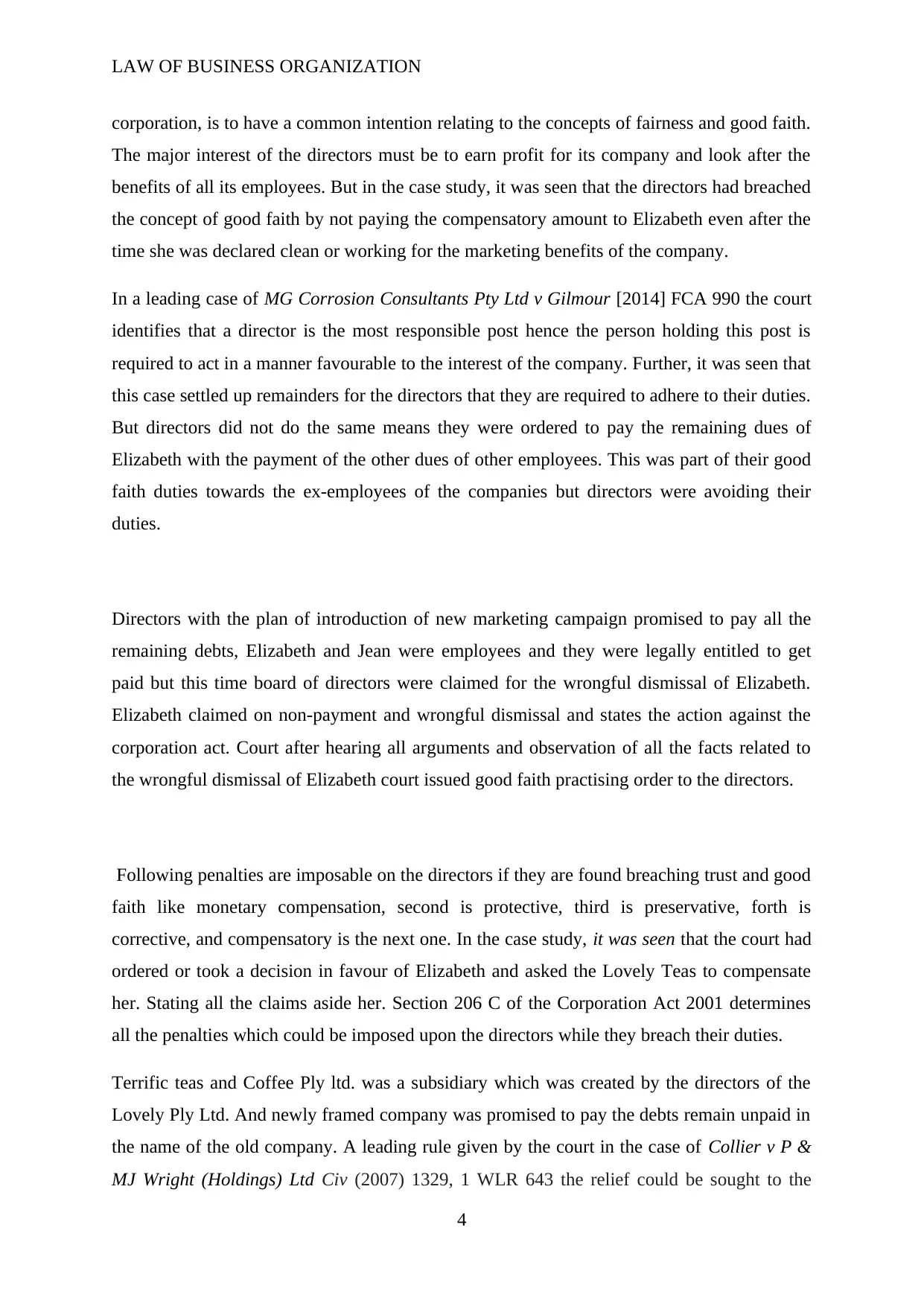
LAW OF BUSINESS ORGANIZATION
corporation, is to have a common intention relating to the concepts of fairness and good faith.
The major interest of the directors must be to earn profit for its company and look after the
benefits of all its employees. But in the case study, it was seen that the directors had breached
the concept of good faith by not paying the compensatory amount to Elizabeth even after the
time she was declared clean or working for the marketing benefits of the company.
In a leading case of MG Corrosion Consultants Pty Ltd v Gilmour [2014] FCA 990 the court
identifies that a director is the most responsible post hence the person holding this post is
required to act in a manner favourable to the interest of the company. Further, it was seen that
this case settled up remainders for the directors that they are required to adhere to their duties.
But directors did not do the same means they were ordered to pay the remaining dues of
Elizabeth with the payment of the other dues of other employees. This was part of their good
faith duties towards the ex-employees of the companies but directors were avoiding their
duties.
Directors with the plan of introduction of new marketing campaign promised to pay all the
remaining debts, Elizabeth and Jean were employees and they were legally entitled to get
paid but this time board of directors were claimed for the wrongful dismissal of Elizabeth.
Elizabeth claimed on non-payment and wrongful dismissal and states the action against the
corporation act. Court after hearing all arguments and observation of all the facts related to
the wrongful dismissal of Elizabeth court issued good faith practising order to the directors.
Following penalties are imposable on the directors if they are found breaching trust and good
faith like monetary compensation, second is protective, third is preservative, forth is
corrective, and compensatory is the next one. In the case study, it was seen that the court had
ordered or took a decision in favour of Elizabeth and asked the Lovely Teas to compensate
her. Stating all the claims aside her. Section 206 C of the Corporation Act 2001 determines
all the penalties which could be imposed upon the directors while they breach their duties.
Terrific teas and Coffee Ply ltd. was a subsidiary which was created by the directors of the
Lovely Ply Ltd. And newly framed company was promised to pay the debts remain unpaid in
the name of the old company. A leading rule given by the court in the case of Collier v P &
MJ Wright (Holdings) Ltd Civ (2007) 1329, 1 WLR 643 the relief could be sought to the
4
corporation, is to have a common intention relating to the concepts of fairness and good faith.
The major interest of the directors must be to earn profit for its company and look after the
benefits of all its employees. But in the case study, it was seen that the directors had breached
the concept of good faith by not paying the compensatory amount to Elizabeth even after the
time she was declared clean or working for the marketing benefits of the company.
In a leading case of MG Corrosion Consultants Pty Ltd v Gilmour [2014] FCA 990 the court
identifies that a director is the most responsible post hence the person holding this post is
required to act in a manner favourable to the interest of the company. Further, it was seen that
this case settled up remainders for the directors that they are required to adhere to their duties.
But directors did not do the same means they were ordered to pay the remaining dues of
Elizabeth with the payment of the other dues of other employees. This was part of their good
faith duties towards the ex-employees of the companies but directors were avoiding their
duties.
Directors with the plan of introduction of new marketing campaign promised to pay all the
remaining debts, Elizabeth and Jean were employees and they were legally entitled to get
paid but this time board of directors were claimed for the wrongful dismissal of Elizabeth.
Elizabeth claimed on non-payment and wrongful dismissal and states the action against the
corporation act. Court after hearing all arguments and observation of all the facts related to
the wrongful dismissal of Elizabeth court issued good faith practising order to the directors.
Following penalties are imposable on the directors if they are found breaching trust and good
faith like monetary compensation, second is protective, third is preservative, forth is
corrective, and compensatory is the next one. In the case study, it was seen that the court had
ordered or took a decision in favour of Elizabeth and asked the Lovely Teas to compensate
her. Stating all the claims aside her. Section 206 C of the Corporation Act 2001 determines
all the penalties which could be imposed upon the directors while they breach their duties.
Terrific teas and Coffee Ply ltd. was a subsidiary which was created by the directors of the
Lovely Ply Ltd. And newly framed company was promised to pay the debts remain unpaid in
the name of the old company. A leading rule given by the court in the case of Collier v P &
MJ Wright (Holdings) Ltd Civ (2007) 1329, 1 WLR 643 the relief could be sought to the
4
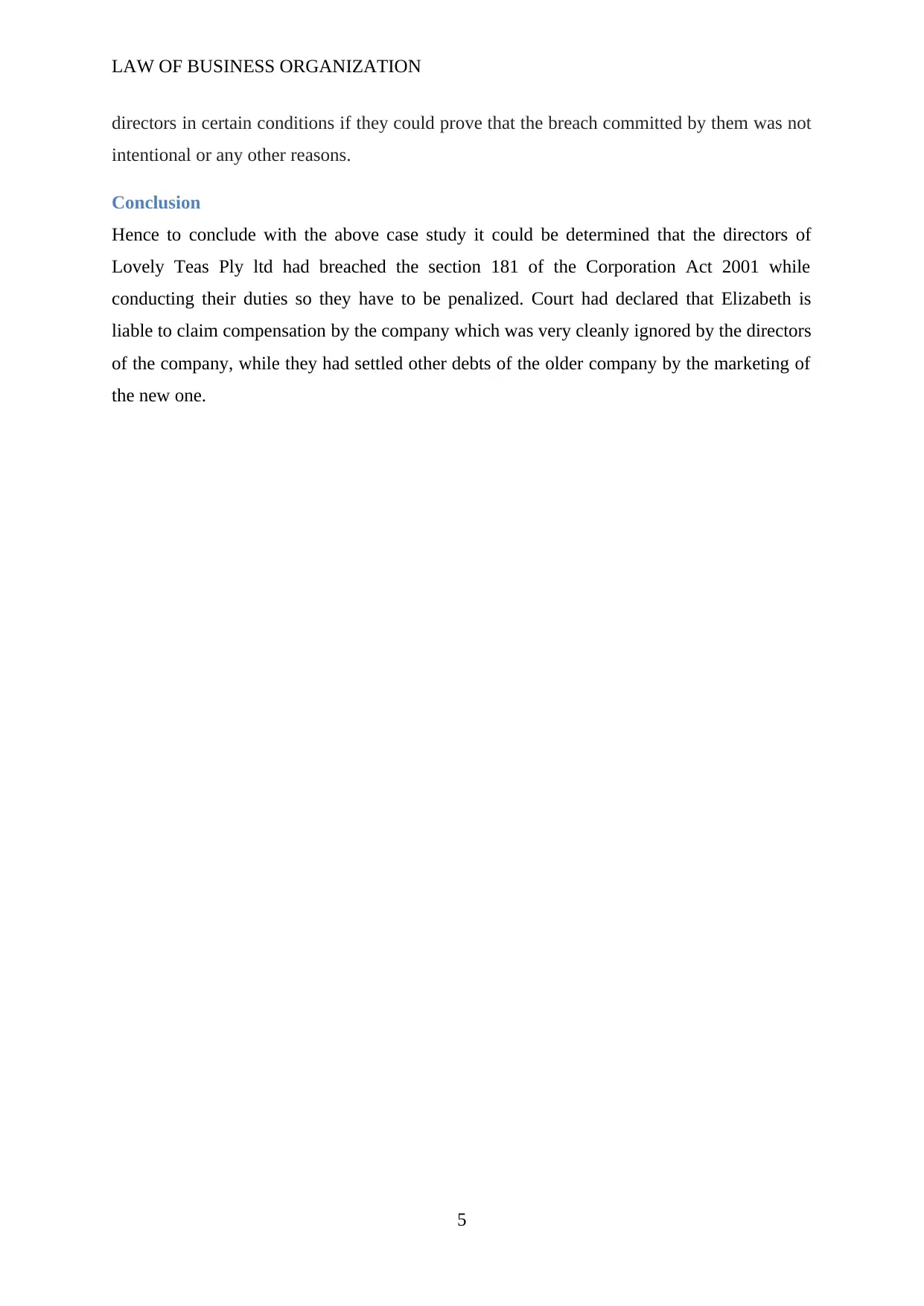
LAW OF BUSINESS ORGANIZATION
directors in certain conditions if they could prove that the breach committed by them was not
intentional or any other reasons.
Conclusion
Hence to conclude with the above case study it could be determined that the directors of
Lovely Teas Ply ltd had breached the section 181 of the Corporation Act 2001 while
conducting their duties so they have to be penalized. Court had declared that Elizabeth is
liable to claim compensation by the company which was very cleanly ignored by the directors
of the company, while they had settled other debts of the older company by the marketing of
the new one.
5
directors in certain conditions if they could prove that the breach committed by them was not
intentional or any other reasons.
Conclusion
Hence to conclude with the above case study it could be determined that the directors of
Lovely Teas Ply ltd had breached the section 181 of the Corporation Act 2001 while
conducting their duties so they have to be penalized. Court had declared that Elizabeth is
liable to claim compensation by the company which was very cleanly ignored by the directors
of the company, while they had settled other debts of the older company by the marketing of
the new one.
5
⊘ This is a preview!⊘
Do you want full access?
Subscribe today to unlock all pages.

Trusted by 1+ million students worldwide
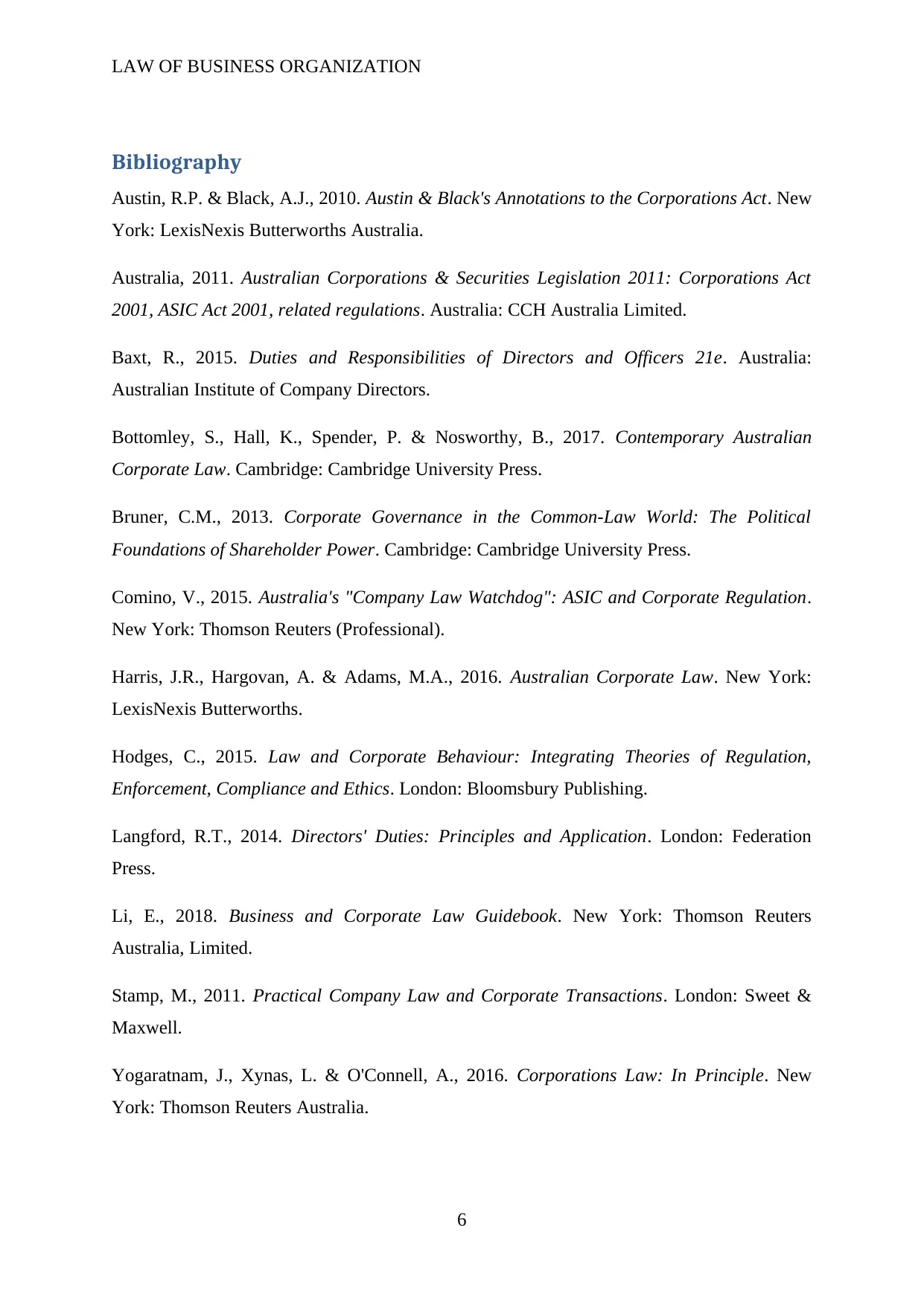
LAW OF BUSINESS ORGANIZATION
Bibliography
Austin, R.P. & Black, A.J., 2010. Austin & Black's Annotations to the Corporations Act. New
York: LexisNexis Butterworths Australia.
Australia, 2011. Australian Corporations & Securities Legislation 2011: Corporations Act
2001, ASIC Act 2001, related regulations. Australia: CCH Australia Limited.
Baxt, R., 2015. Duties and Responsibilities of Directors and Officers 21e. Australia:
Australian Institute of Company Directors.
Bottomley, S., Hall, K., Spender, P. & Nosworthy, B., 2017. Contemporary Australian
Corporate Law. Cambridge: Cambridge University Press.
Bruner, C.M., 2013. Corporate Governance in the Common-Law World: The Political
Foundations of Shareholder Power. Cambridge: Cambridge University Press.
Comino, V., 2015. Australia's "Company Law Watchdog": ASIC and Corporate Regulation.
New York: Thomson Reuters (Professional).
Harris, J.R., Hargovan, A. & Adams, M.A., 2016. Australian Corporate Law. New York:
LexisNexis Butterworths.
Hodges, C., 2015. Law and Corporate Behaviour: Integrating Theories of Regulation,
Enforcement, Compliance and Ethics. London: Bloomsbury Publishing.
Langford, R.T., 2014. Directors' Duties: Principles and Application. London: Federation
Press.
Li, E., 2018. Business and Corporate Law Guidebook. New York: Thomson Reuters
Australia, Limited.
Stamp, M., 2011. Practical Company Law and Corporate Transactions. London: Sweet &
Maxwell.
Yogaratnam, J., Xynas, L. & O'Connell, A., 2016. Corporations Law: In Principle. New
York: Thomson Reuters Australia.
6
Bibliography
Austin, R.P. & Black, A.J., 2010. Austin & Black's Annotations to the Corporations Act. New
York: LexisNexis Butterworths Australia.
Australia, 2011. Australian Corporations & Securities Legislation 2011: Corporations Act
2001, ASIC Act 2001, related regulations. Australia: CCH Australia Limited.
Baxt, R., 2015. Duties and Responsibilities of Directors and Officers 21e. Australia:
Australian Institute of Company Directors.
Bottomley, S., Hall, K., Spender, P. & Nosworthy, B., 2017. Contemporary Australian
Corporate Law. Cambridge: Cambridge University Press.
Bruner, C.M., 2013. Corporate Governance in the Common-Law World: The Political
Foundations of Shareholder Power. Cambridge: Cambridge University Press.
Comino, V., 2015. Australia's "Company Law Watchdog": ASIC and Corporate Regulation.
New York: Thomson Reuters (Professional).
Harris, J.R., Hargovan, A. & Adams, M.A., 2016. Australian Corporate Law. New York:
LexisNexis Butterworths.
Hodges, C., 2015. Law and Corporate Behaviour: Integrating Theories of Regulation,
Enforcement, Compliance and Ethics. London: Bloomsbury Publishing.
Langford, R.T., 2014. Directors' Duties: Principles and Application. London: Federation
Press.
Li, E., 2018. Business and Corporate Law Guidebook. New York: Thomson Reuters
Australia, Limited.
Stamp, M., 2011. Practical Company Law and Corporate Transactions. London: Sweet &
Maxwell.
Yogaratnam, J., Xynas, L. & O'Connell, A., 2016. Corporations Law: In Principle. New
York: Thomson Reuters Australia.
6
Paraphrase This Document
Need a fresh take? Get an instant paraphrase of this document with our AI Paraphraser
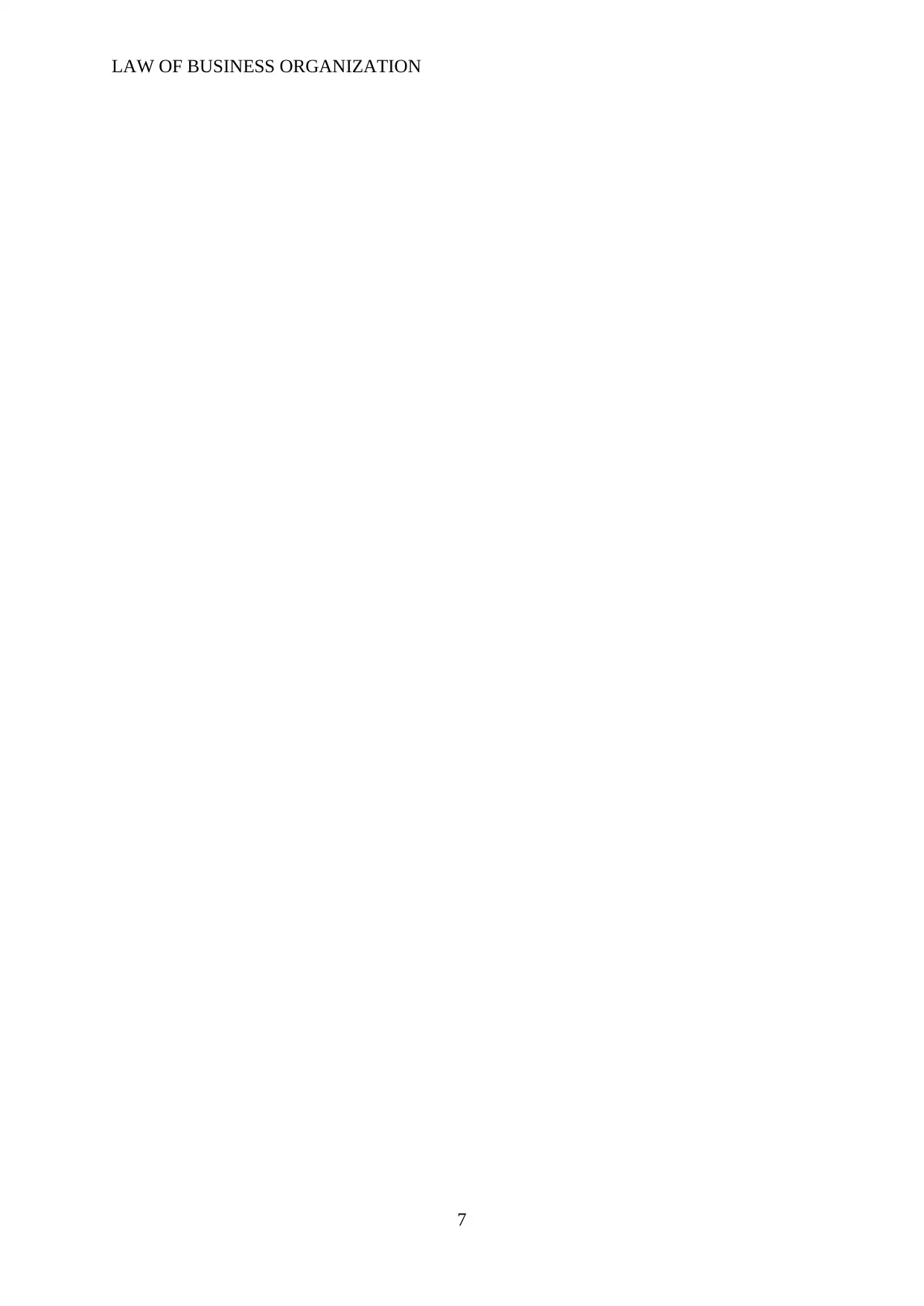
LAW OF BUSINESS ORGANIZATION
7
7
1 out of 8
Related Documents
Your All-in-One AI-Powered Toolkit for Academic Success.
+13062052269
info@desklib.com
Available 24*7 on WhatsApp / Email
![[object Object]](/_next/static/media/star-bottom.7253800d.svg)
Unlock your academic potential
Copyright © 2020–2026 A2Z Services. All Rights Reserved. Developed and managed by ZUCOL.





